人教版英语七年级下册第四单元短语语法知识点总结知识分享
(完整版)人教版七年级下英语(unit4)知识点总结全
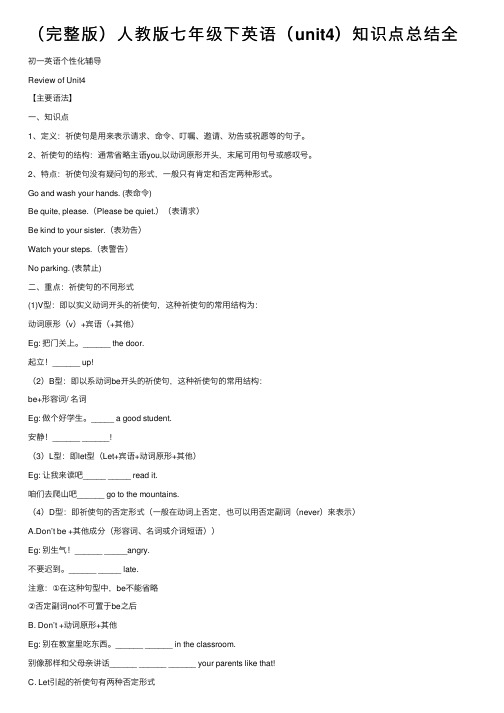
(完整版)⼈教版七年级下英语(unit4)知识点总结全初⼀英语个性化辅导Review of Unit4【主要语法】⼀、知识点1、定义:祈使句是⽤来表⽰请求、命令、叮嘱、邀请、劝告或祝愿等的句⼦。
2、祈使句的结构:通常省略主语you,以动词原形开头,末尾可⽤句号或感叹号。
2、特点:祈使句没有疑问句的形式,⼀般只有肯定和否定两种形式。
Go and wash your hands. (表命令)Be quite, please.(Please be quiet.)(表请求)Be kind to your sister.(表劝告)Watch your steps.(表警告)No parking. (表禁⽌)⼆、重点:祈使句的不同形式(1)V型:即以实义动词开头的祈使句,这种祈使句的常⽤结构为:动词原形(v)+宾语(+其他)Eg: 把门关上。
______ the door.起⽴!______ up!(2)B型:即以系动词be开头的祈使句,这种祈使句的常⽤结构:be+形容词/ 名词Eg: 做个好学⽣。
_____ a good student.安静!______ ______!(3)L型:即let型(Let+宾语+动词原形+其他)Eg: 让我来读吧_____ _____ read it.咱们去爬⼭吧______ go to the mountains.(4)D型:即祈使句的否定形式(⼀般在动词上否定,也可以⽤否定副词(never)来表⽰)A.Don’t be +其他成分(形容词、名词或介词短语))Eg: 别⽣⽓!______ _____angry.不要迟到。
______ _____ late.注意:①在这种句型中,be不能省略②否定副词not不可置于be之后B. Don’t +动词原形+其他Eg: 别在教室⾥吃东西。
______ ______ in the classroom.别像那样和⽗母亲讲话______ ______ ______ your parents like that!C. Let引起的祈使句有两种否定形式a. Let+宾语+not+动词原形+其他Let her not do that.Let’s not think about it. It’s only a waste of time.b. Don’t+ let+宾语+动词原形+其他Don’t let Jim do that.Don’t let us go, please.三、难点:1、特殊形式的祈使句(1)在公共场合的提⽰语中,否定祈使句常⽤“No+名词/ V-ing形式”结构,表⽰“禁⽌做某事”。
人教版英语七年级下册第四单元短语语法知识点总结知识讲解

人教版英语七年级下册第四单元短语语法知识点总结Unit 4Don’t eat in class【短语归纳】1.on time 准时,按时2. listen to …听……3. in class 在课上4. be late for 做……迟到5. have to 不得不6. be quiet安静7. go out外出 8. do the dishes 清洗餐具9. make breakfast 做早饭10. make (one’s) bed 铺床11. be noisy 吵闹12. keep one’s hair short 留短发13. play with sb. 和某人一起玩 14. play the piano 弹钢琴15. have fun 玩得高兴 16. make rules 制订规则【用法集萃】1.Don’t + 动词原形+其他,不要做某事。
2.help sb. (to) do sth. 帮助某人做某事3.too many + 可数名词复数太多的……4.practice doing sth. 练习做某事5. be strict with sb. 对某人要求严格6. be strict in sth. 对某事要要求严格7. leave sth sp. 把某物忘在某地8. keep + 宾语+形容词使……保持某种状态9. learn to do sth. 学会做某事10. have to do sth. 不得不做某事┃语法探究┃Ⅰ.祈使句定义:用于表达命令、请求、劝告、警告、禁止等的句子叫__________句。
时态:使用______________时态。
结构:动词原形+其他成分+ please. 否定祈使句在动词原形前面加__________ 。
如:Be quiet in the classroom, please.在教室里请保持安静。
Don't fight. 不要打架Ⅱ.情态动词have to 和must1.情态动词have to和must都表示“__________”的意思。
人教版七年级下册unit4知识点

1 want to do sth 想要作某事2 give sb sth = give sth to sb 给某人某物/ 把某物给某人3 help sb do sth 帮助某人作某事Eg: I want to help my mother do some housework at home.4 help sb with sth 帮助某人谋事Eg: I want to help my mother with some housework at home5 in the day 在白天6 at night 在晚上7 talk with/ to sb 和----谈话8 be busy doing sth 忙于做某事Eg: He is busy listening to the teacher.9 in a hospital 在医院l10 work/ study hard 努力工作11 Evening Newspaper 晚报1.询问别人干什么工作。
句型:What+do/does+某人+do?=What+be+sb.?=What+be+one’s+job?回答:主语+ be+ a+表示职业的名词。
例:-What do you do?你是干什么的?-I’m a student.我是一句学生。
-What does he do? = What's he? = What's his job? 他是干什么的?-He’s a teacher.他是一名教师。
2.询问别人想干什么工作。
句型:What+do/does+某人+want to be?回答:主语+ want/wants to be+ a +表示职业的名词。
表示“想当......”例:-What do you want to be? 你想干什么工作?-I want to be a teacher.我想当教师。
-What does she want to be ?她想干什么工作?-She wants to be a nuser.她想当护士。
人教版七年级下册英语Unit4单元语法知识点总结

人教版七年级下册英语Unit4单元语法知识点总结重要短语具体用法和例句:1. on time:准时,按时。
例如:I always arrive at school on time.(我总是按时到达学校。
)2. listen to…:听……。
例如:She likes to listen to music.(她喜欢听音乐。
)3. in class:在课上。
例如:We should pay attention in class.(我们在课上应该注意听讲。
)4. be late for:做……迟到。
例如:Don't be late for the meeting.(不要开会迟到。
)5. have to:不得不。
例如:I have to finish my homework before going out.(我不得不做完作业再出去。
)6. be quiet:安静。
例如:Please be quiet in the library.(在图书馆请保持安静。
)7. go out:外出。
例如:I like to go out with my friends on weekends.(我喜欢周末和朋友们出去。
)8. do the dishes:清洗餐具。
例如:It's your turn to do the dishes.(轮到你清洗餐具了。
)9. make breakfast:做早饭。
例如:My mom makes breakfast for me every morning.(我妈妈每天早上为我做早饭。
)10. make (one’s) bed:铺床。
例如:You should make your bed by yourself.(你应该自己铺床。
)11. be noisy:吵闹。
例如:The children are being noisy.(孩子们很吵闹。
)12. keep one’s hair short:留短发。
人教版七年级下册英语第四单元知识点整理
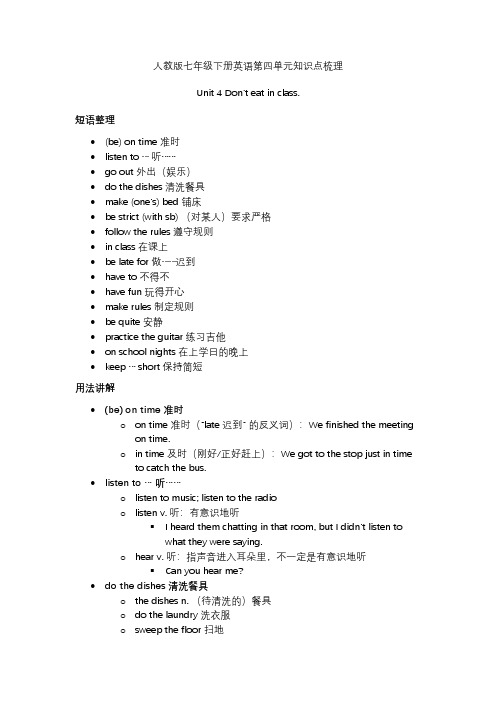
人教版七年级下册英语第四单元知识点梳理Unit 4 Don’t eat in class.短语整理•(be) on time 准时•listen to … 听……•go out 外出(娱乐)•do the dishes 清洗餐具•make (one’s) bed 铺床•be strict (with sb) (对某人)要求严格•follow the rules 遵守规则•in class 在课上•be late for 做……迟到•have to 不得不•have fun 玩得开心•make rules 制定规则•be quite 安静•practice the guitar 练习吉他•on school nights 在上学日的晚上•keep … short 保持简短用法讲解•(be) on time 准时o on time 准时(“late 迟到” 的反义词):We finished the meeting on time.o in time 及时(刚好/正好赶上):We got to the stop just in time to catch the bus.•listen to … 听……o listen to music; listen to the radioo listen v. 听:有意识地听▪I heard them chatting in that room, but I didn’t listen towhat they were saying.o hear v. 听:指声音进入耳朵里,不一定是有意识地听▪Can you hear me?•do the dishes 清洗餐具o the dishes n. (待清洗的)餐具o do the laundry 洗衣服o sweep the floor 扫地o mop the floor 拖地o do the cooking 做饭•make (one’s) bed 铺床o Remember to make your bed!•be strict (with sb) (对某人)要求严格o The teacher is strict with us.•follow the rules 遵守规则o= obey the ruleso= observe the ruleso We must follow the rules in the school.•in class 在课上o You shouldn’t eat in class. 上课时不能吃东西。
人教版七年级英语下册unit4(详细内容)

人教版七年级英语下册Unit 4 Don’t eat in class一、单词回顾1、rule[ruːl]规则;规章2、arrive [ə'raɪv]到达3、hallway['hɔːlweɪ]走廊;过道4、hall [hɔːl]大万礼堂5、listen ['lɪs(ə)n]听;倾听6、fight [faɪt] 打架;战斗7、sorry ['sɒrɪ]抱歉的;难过的;惋惜的8、outside [aʊt'saɪd] ad. v.在外面adj.外面的9、wear [weə]穿;戴10、important [ɪm'pɔːt(ə)nt]重要的11、bring [brɪŋ]带来;取来12、player ['pleɪə]播放机;运动员13、uniform ['juːnɪfɔːm]校服;制服14、quiet ['kwaɪət]安静的15、out [aʊt]外出16、dish [dɪʃ]碟;盘dishes17、night[naɪt]晚上18、before[bɪ'fɔː]prep.conj在…以前adv.以前19、dirty ['dɜːtɪ]脏的20、kitchen ['kɪtʃɪn]厨房21、more [mɔː]更多的22、noisy ['nɒɪzɪ]吵闹的23、relax [rɪ'læks]放松;休息24、read [riːd]读;阅读25、terrible['terɪb(ə)l]非常讨厌的;可怕的26、feel [fiːl]感受;觉的27、strict [strɪkt]严格的;严厉的28、remember [rɪ'membə] 记住;记起29、follow ['fɒləʊ]遵循;跟随30、luck [lʌk] 幸运;运气31、keep [kiːp]保持;保留32、hair [heə]头发;毛发33、learn [lɜːn]学习;学会二、讲解1.M r /mist / 先生。
人教版英语初一下学期第四单元知识点大总结

人教版英语初一下学期第四单元知识点大总结人教版英语初一下学期第四单元主要讲述了以下几个知识点:1. 表示能力和无能力:- 表示能力:can(肯定句)、be able to(否定句和疑问句) e.g. I can swim.(我会游泳。
)She is able to play the piano.(她会弹钢琴。
)注意:在否定句和疑问句中,can要用be able to来替代。
- 表示无能力:cannot(或can’t)e.g. I cannot sing.(我不会唱歌。
)2. 表示意愿和打算:- 意愿:would like to(或want to)e.g. I would like to go shopping.(我想去购物。
)They want to watch a movie.(他们想看电影。
)- 打算:be going toe.g. I am going to visit my grandparents tomorrow.(我明天要去看望我的祖父母。
)3. 第一时间提出建议:- Shall we... ?e.g. Shall we go for a walk?(我们出去散散步好吗?)4. 英文缩写:- 单词缩写:I'm(I am)、isn't(is not)、that's(that is)等 - 月份缩写:Jan.(January)、Feb.(February)等5. 短语和句型:- in the swimming pool(在游泳池里) - go camping(去露营)- have a good time(过得愉快)- fly kites(放风筝)- take a walk(散步)- the day after tomorrow(后天)- next month(下个月)。
英语人教版初一下 第四单元 语法归纳
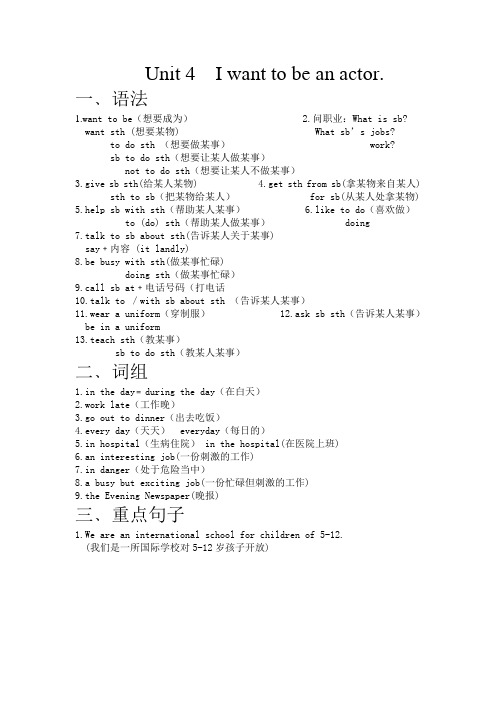
Unit 4 I want to be an actor.一﹑语法1.want to be(想要成为)2.问职业:What is sb? want sth (想要某物) What sb’s jobs?to do sth (想要做某事) work?sb to do sth(想要让某人做某事)not to do sth(想要让某人不做某事)3.give sb sth(给某人某物)4.get sth from sb(拿某物来自某人) sth to sb(把某物给某人) for sb(从某人处拿某物)5.help sb with sth(帮助某人某事)6.like to do(喜欢做) to (do) sth(帮助某人做某事) doing7.talk to sb about sth(告诉某人关于某事)say﹢内容 (it landly)8.be busy with sth(做某事忙碌)doing sth(做某事忙碌)9.call sb at﹢电话号码(打电话10.talk to /with sb about sth (告诉某人某事)11.wear a uniform(穿制服) 12.ask sb sth(告诉某人某事) be in a uniform13.teach sth(教某事)sb to do sth(教某人某事)二﹑词组1.in the day﹦during the day(在白天)2.work late(工作晚)3.go out to dinner(出去吃饭)4.every day(天天) everyday(每日的)5.in hospital(生病住院) in the hospital(在医院上班)6.an interesting job(一份刺激的工作)7.in danger(处于危险当中)8.a busy but exciting job(一份忙碌但刺激的工作)9.the Evening Newspaper(晚报)三﹑重点句子1.We are an international school for children of 5-12.(我们是一所国际学校对5-12岁孩子开放)。
202X年人教版英语七年级下册第四单元短语语法知识点总结
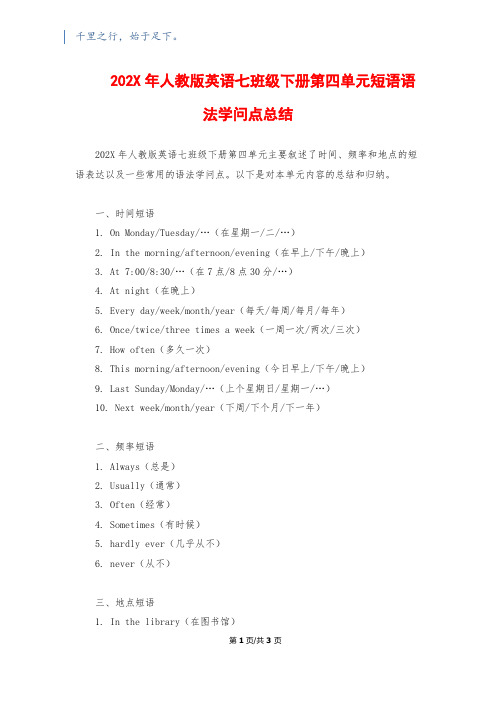
千里之行,始于足下。
202X年人教版英语七班级下册第四单元短语语法学问点总结202X年人教版英语七班级下册第四单元主要叙述了时间、频率和地点的短语表达以及一些常用的语法学问点。
以下是对本单元内容的总结和归纳。
一、时间短语1. On Monday/Tuesday/…(在星期一/二/…)2. In the morning/afternoon/evening(在早上/下午/晚上)3. At 7:00/8:30/…(在7点/8点30分/…)4. At night(在晚上)5. Every day/week/month/year(每天/每周/每月/每年)6. Once/twice/three times a week(一周一次/两次/三次)7. How often(多久一次)8. This morning/afternoon/evening(今日早上/下午/晚上)9. Last Sunday/Monday/…(上个星期日/星期一/…)10. Next week/month/year(下周/下个月/下一年)二、频率短语1. Always(总是)2. Usually(通常)3. Often(经常)4. Sometimes(有时候)5. hardly ever(几乎从不)6. never(从不)三、地点短语1. In the library(在图书馆)第1页/共3页锲而不舍,金石可镂。
2. At the park(在公园)3. On the playground(在操场上)4. At home(在家)5. In the classroom(在教室)6. At school(在学校)7. In the city(在城市)8. In the country(在农村)9. In the mountains(在山里)10. On the beach(在海滩)四、语法学问点1. 一般现在时的用法:1) 表示经常性的动作或习惯;2) 表示客观真理、自然现象、科学事实等;3) 表示固定的时间表或时间支配;4) 表示心理活动或感觉等。
最全面人教版七年级下册英语第四单元知识点归纳总结
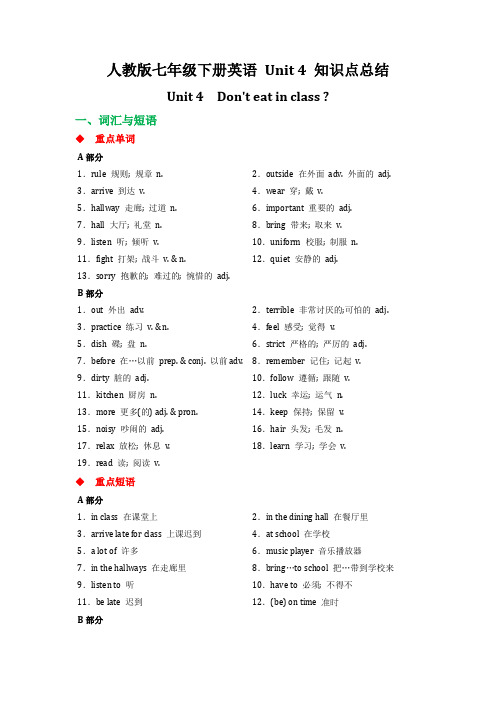
人教版七年级下册英语Unit 4 知识点总结Unit 4 Don't eat in class ?一、词汇与短语◆重点单词A部分1.rule 规则; 规章n.2.outside 在外面adv. 外面的adj. 3.arrive 到达v.4.wear 穿; 戴v.5.hallway 走廊; 过道n.6.important 重要的adj.7.hall 大厅; 礼堂n.8.bring 带来; 取来v.9.listen 听; 倾听v.10.uniform 校服; 制服n. 11.fight 打架; 战斗v. & n.12.quiet 安静的adj.13.sorry 抱歉的; 难过的; 惋惜的adj.B部分1.out 外出adv.2.terrible 非常讨厌的;可怕的adj. 3.practice 练习v. & n.4.feel 感受; 觉得v.5.dish 碟; 盘n.6.strict 严格的; 严厉的adj. 7.before 在…以前prep. & conj. 以前adv.8.remember 记住; 记起v. 9.dirty 脏的adj.10.follow 遵循; 跟随v. 11.kitchen 厨房n.12.luck 幸运; 运气n.13.more 更多(的) adj. & pron.14.keep 保持; 保留v. 15.noisy 吵闹的adj.16.hair 头发; 毛发n.17.relax 放松; 休息v.18.learn 学习; 学会v.19.read 读; 阅读v.◆重点短语A部分1.in class 在课堂上2.in the dining hall 在餐厅里3.arrive late for class 上课迟到4.at school 在学校5.a lot of 许多6.music player 音乐播放器7.in the hallways 在走廊里8.bring…to school 把…带到学校来9.listen to 听10.have to 必须; 不得不11.be late 迟到12.(be) on time 准时B部分1.too many 太多的2.go out 外出(娱乐)3.on school nights 在上学期间的晚上4.practice the guitar 练习吉他5.do the dishes. 清洗餐具6.make breakfast 做早饭7.make one's bed 铺床8.read a book 看书9.think about 考虑10.be strict (with sb.) (对某人)要求严格11.follow the rules 遵守规则12.good luck 祝好运◆重点句子A部分1.Don't arrive late for class. You must be on time. 不准上课迟到,务必守时。
人教版七年级英语下册Unit4重点短语、语法汇总
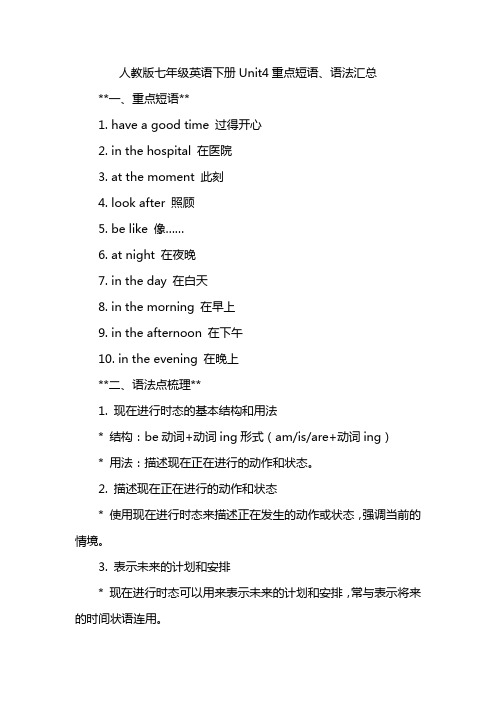
人教版七年级英语下册Unit4重点短语、语法汇总**一、重点短语**1. have a good time 过得开心2. in the hospital 在医院3. at the moment 此刻4. look after 照顾5. be like 像……6. at night 在夜晚7. in the day 在白天8. in the morning 在早上9. in the afternoon 在下午10. in the evening 在晚上**二、语法点梳理**1. 现在进行时态的基本结构和用法* 结构:be动词+动词ing形式(am/is/are+动词ing)* 用法:描述现在正在进行的动作和状态。
2. 描述现在正在进行的动作和状态* 使用现在进行时态来描述正在发生的动作或状态,强调当前的情境。
3. 表示未来的计划和安排* 现在进行时态可以用来表示未来的计划和安排,常与表示将来的时间状语连用。
4. 现在进行时态与always的连用,表示情感态度* 使用现在进行时态与always连用,可以表达强烈的情感态度,如赞扬、批评等。
**三、常用表达总结**1. What are you doing now? 你现在正在做什么?2. I’m watching TV. 我正在看电视。
3. They are playing basketball. 他们正在打篮球。
4. She is singing in the room. 她正在房间里唱歌。
5. We are studying English. 我们正在学习英语。
6. They are always helping others. 他们总是帮助别人。
7. I am always busy on weekdays. 我工作日总是很忙。
8. She is always coming to class early. 她总是很早就来上课。
**四、易错知识点解析**1. 区分现在进行时态与其他时态的用法:现在进行时态主要描述现在的动作,而一般现在时态描述习惯性或经常发生的动作。
人教版七年级下册英语第四单元知识点复习总结
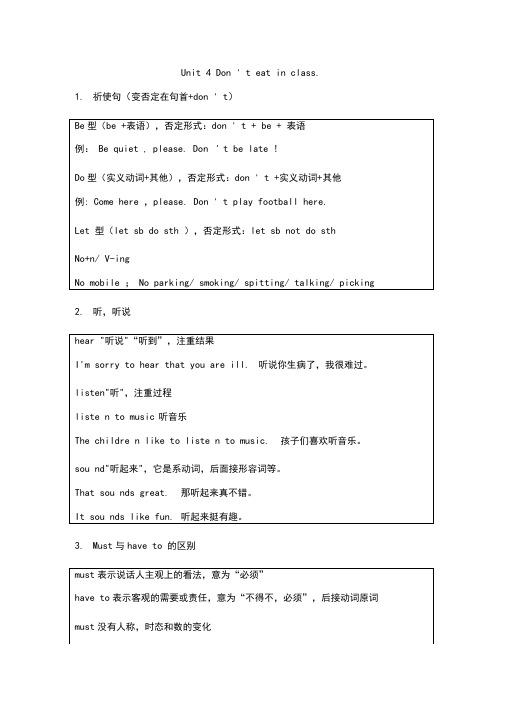
Unit 4 Don ' t eat in class.1.祈使句(变否定在句首+don ' t)2.听,听说3.Must与have to 的区别4.Must与have to 的区别5. Too many 用法1) good luck 好运luck —lucky —luckily名词“幸运”用在形容词后luck 如:Gook luck用ed,物用ing1)遵守,相当于obeyfollow the rules=obey the rules 遵守规贝U break the rules 违反规定2)follow sb.跟着某人follow me 跟我,随我来3)follow sb. to do sth. 跟着某人做某事7.到达,抵达的多种用法1)arrive at + 小地点 (学校、图书馆)2)arrive in + 大地点 (机场、城市)3)get to + 地点get to Beiji ng 到达北京get to school 到达学校4)reach +地点到达,后面直接接到达的地点,不需要介词。
如reach Beijing 到达北京reach home 到家注意:get、arrive后接副词时,介词省略。
get home 至U家;get there 到那儿;arrive home 至U家;arrive there到那儿8.strict的用法1)be strict with sb. 对某人严格2)be strict in sth. 对某物要求严格9. 辨别几个穿1) wear 衣物(穿好了、状态)2) put on 衣物(穿上,动作)3) be in 颜色(状态)10. 辨别几个带1) bring 带来(远到近)2) take away 带走(近到远)3)get 去拿(去又回)11. 辨别几个看1) look at 看,盯着2) read 读书,阅读3) watch TV\film 、game\match 欣赏4) see a film/movie/ 物,强调看的结果12.in class 在课堂上in the classroom 在教室13.be on time 准时be in time 及时14.fight with sb. 与某人打架Fight for sth. 为…而战斗15.rule 规则(名词);统治,管理(动词)school rules 学校规则family rules 家庭规则16.some of … 一些some of the rules 一些规则17.bring…to…把…..带来take…to…把…..带走18.practice doing sth. 练习(做)某事19.on school days/ nights 在上学日/ 在上学的晚上20.make one 's/ the bed 整理床铺go to bed 上床睡觉21.do the dishes 洗碗碟22.remember/ forget+ to do 记得/ 忘记要做.remember/ forget+ doing 记得/ 忘记做过...23.before/after +doing 做….之前/之后after playing football 踢足球之后24.in the evening=at night 在晚上good night 晚安good evening 晚上好25.leave sth. + 地点把某物留在某地leave the dirty dishes in the kitchen 留脏碗具在厨房26.noise (名词)噪音make much noise 制造噪音noisy (形容词)吵闹的benoisyquiet 安静的—quite 十分的,非常的27.learn to do sth. 学习做某事28.keep (sth )adj. 保持… .keep (on) doing sth. 坚持做某事例:keep healthy 保持健康keep reading 坚持读书health 名词healthy 形容词29.be late for 迟到。
人教版七年级下册英语Unit 4 知识点语法归纳总结
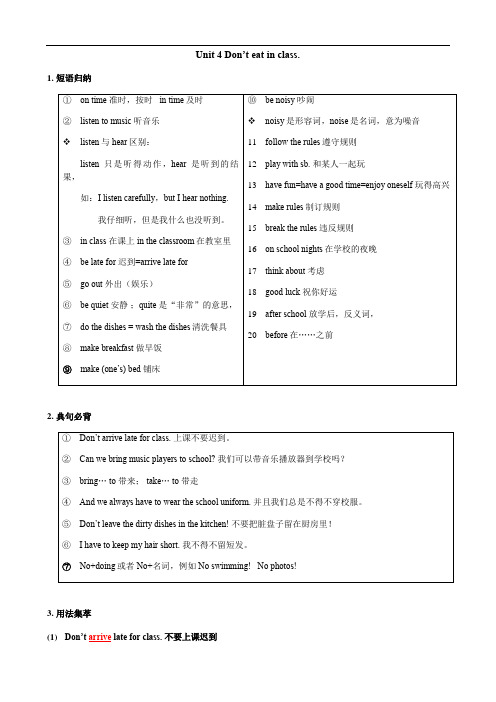
Unit 4 Don’t eat in class.1.短语归纳2.典句必背3.用法集萃(1)Don’t arrive late for class. 不要上课迟到❖arrive in❖arrive at(2)You must be on time. 你必须准时。
❖on time是固定搭配,意为“按时;准时”。
例:Don’t worry. The train will arrive on time. 别担心。
火车会准时到达的。
❖常见的time短语(3)Don’t listen to music in class. 不要上课时听音乐牛刀小试—Do you like the songs by Taylor?一Yes. Country music ______ nice and full of feelings.A. SoundsB.listensC. hearsD. looks(4)This is very important. 这是很重要的❖important作形容词,意为“重要的”。
如:The first lesson is very important. 第一课是很重要的❖反义词:unimportant adj. 不重要的❖派生词:importance n. 重要;重要性(5)Can we bring music players to school? 我们可以把音乐播放器带到学校里来吗?❖bring作动词,意为“带来;拿来”例:Don’t forget to bring your homework here. 不要忘记把你的家庭作业带过来❖辨析bring, take, carry和get牛刀小试Don’t forget _____ your photos here when you come to school.A.bringingB. to takeC. takingD. to bring(6)Oh, and we also have to be quiet in the library. 哦,我们在图书馆里还必须保持安静❖quiet作形容词,意为“安静的”,可以用来修饰人,也可以用来形容地点或场所等。
- 1、下载文档前请自行甄别文档内容的完整性,平台不提供额外的编辑、内容补充、找答案等附加服务。
- 2、"仅部分预览"的文档,不可在线预览部分如存在完整性等问题,可反馈申请退款(可完整预览的文档不适用该条件!)。
- 3、如文档侵犯您的权益,请联系客服反馈,我们会尽快为您处理(人工客服工作时间:9:00-18:30)。
Unit 4Don’t eat in class【短语归纳】1.on time 准时,按时2. listen to …听……3. in class 在课上4. be late for 做……迟到5. have to 不得不6. be quiet安静7. go out外出8. do the dishes 清洗餐具9. make breakfast 做早饭10. make (one’s) bed 铺床11. be noisy 吵闹12. keep on e’s hair short 留短发13. play with sb. 和某人一起玩14. play the piano 弹钢琴15. have fun 玩得高兴16. make rules 制订规则【用法集萃】1.Don’t + 动词原形+其他,不要做某事。
2.help sb. (to) do sth. 帮助某人做某事3.too many + 可数名词复数太多的……4.practice doing sth. 练习做某事5. be strict with sb. 对某人要求严格6. be strict in sth. 对某事要要求严格7. leave sth sp. 把某物忘在某地8. keep + 宾语+形容词使……保持某种状态9. learn to do sth. 学会做某事10. have to do sth. 不得不做某事┃语法探究┃Ⅰ.祈使句定义:用于表达命令、请求、劝告、警告、禁止等的句子叫__________句。
时态:使用______________时态。
结构:动词原形+其他成分+please. 否定祈使句在动词原形前面加__________ 。
如:Be quiet in the classroom, please.在教室里请保持安静。
Don't fight. 不要打架Ⅱ.情态动词have to 和must1.情态动词have to和must都表示“__________”的意思。
have to 表示从__________条件上来看必须做某事;must表示说话人__________必须要做某事。
如:There is no bus, you have to walk home. (没有公交车是客观条件)没有公共汽车,你必须走回家。
I must study English well. (想学好英语是一种主观想法)我必须要学好英语。
2.have to有__________、__________和__________的变化,而must只有一种形式如:He has to stay at home, it's raining.他必须待在家中,下雨了。
3.在否定结构中don't have to表示“__________”,而mustn't表示“__________”。
如:You don't have to wait for him. 你没必要等他。
You mustn't play with fire. It's dangerous.你禁止玩火。
那很危险。
【练习吧】( )1. —Can I go to the park, Mum?—Certainly. But you ________be back before six o'clock.A. canB. mayC. mightD. must( )2. You ________ stop when the traffic light turnsred.A. canB. have toC. needD. had better( )3. ________ come late to school tomorrow!A. DoB. DoesC. BeD. Don't根据提示补全下列单词。
1. There are so many people, it’s too c___________.2. Can you r_________ your teacher’s phone number?3. Stop f________! The teacher is coming.4. My mother is very s________ with me.5. We must f________ the rules at school.6. She w______ a beautiful dress today.7. We must wear school u__________ on Monday.8. We can’t eat in class, we have to eat in the d_____________ hall.9. We can’t run in the h____________.10. Do you want to l_________ to play chess?单项选择。
( ) 1. Jack, ____________ eat in the classroom.A. can’tB. doesn’t have toC. don’tD. doesn’t( ) 2. We can’t eat ________.A. in classB. in the class B. in classroom( ) 3. Must I get up early every day? _________________A. No, you can’t.B. No, you mustn’t.C. No, you don’t have to.( ) 4. Please__ __to me. A. to listen B. listening C. listen( ) 5. We have______ homework, and the homework is difficult.A. too many; too muchB. many too; much tooC. too much; too muchD. too much; much too( ) 6. It takes him two hours_______.A. watch TVB. watching TVC. watches TVD. to watch TV┃能力提升训练┃Ⅰ.选择恰当的选项补全对话(其中有两项多余)A. How do you spell it?B. How are you?C. What‟s this in English?G. Nice to meet you. D. What‟s your telephone number? E. No. I am not. F. Yes, it isA: Hi! I am Kate. Are you Mike?B: 1 I am Paul.A: 2.B: P-A-U-L.A: 3.B: I am fine, thanks.A: 4.B: It‟s 458-7521.A: Is this your notebook?B: 5. My name is on it.Ⅱ. 完形填空Mary is an American __1__. She is now in Beijing with __2__parents. Mary doesn't know Chinese, but she is trying to study and __3__ it.It's Sunday morning. She goes out. She is going to the __4__to see the elephants and monkeys, but she doesn't know how to get __5__. She asks a__6__schoolboy. The boy can't understand her. Then she takes out a pen and a piece of__7__. She__8__ an elephant on it, and shows the__9__ to the boy. The boy smiles and then he shows Mary the __10__ to the zoo.( )1. A. schoolboy B. schoolgirlC. teacherD. worker( )2.A. his B. she C. him D. her( )3.A. speak B. say C. tell D. see( )4.A. farm B. schoolC. zooD. factory( )5.A. the park B. thereC. the schoolD. the farm( )6.A. English B. AmericanC. AustralianD. Chinese( )7.A. paper B. book C. pencil D. eraser( )8.A. writes B. Puts C. draws D. sees( )9.A. monkey B. horseC. pictureD. dogs( )10.A. way B. pictureC. elephantD. park。
